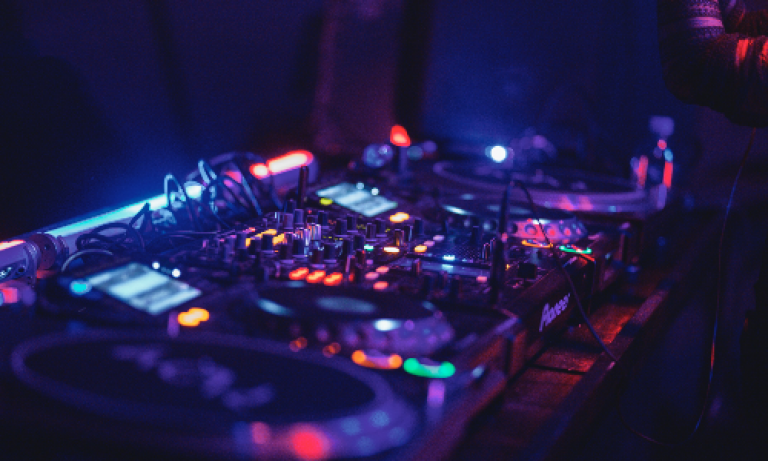UCL Anthrobeats – Data Dance: The Sound of Space and Mobility
22 June 2022, 4:00 pm–8:00 pm

Utilising the medium of sound/music through the process of sonification, we transform data into sound, developing a DJ set of the dataset.
This event is free.
Event Information
Open to
- All
Availability
- Yes
Cost
- Free
Organiser
-
Institute of Advanced Studies / UCL European Institute
Location
-
IAS ForumWilkins BuildingGower StreetLondonWC1E 6BTUnited Kingdom
Data has become inextricably attached to the fundamental ways we comprehend our worlds. From vital medical data that safe-guards the health of a community to points on a Starbucks coffee card, data is our mirror-self within the global interconnected system. As Anthropologists, we have been taught that thick-data in the ethnographic sense, focussed on individuals within a community, is the way to comprehend larger cultural patterns. However, with the advent of big data, large caches of information on a populational scale, shape and are shaped by the choices we make on a day to day basis. We find that this distinction between big and thick data has become obsolete. Incredibly intimate and personal data is collected from each of us; social media, internet browsing, contactless payments, tapping in and out of the lecture hall. Despite being collected to represent populational trends, we can observe the ways in which datapoints represent a detailed summation of the individual. The implications of this are yet to be fully analysed or realised, but one consequence that we have come to identify through our own experience is a sense of disarticulation between cause and affect (rather than effect), as real world embodied experiences are increasingly represented and thus ingested as 0s and 1s.
Our project offers an alternative pathway. Utilising the medium of sound/music through the process of sonification, we transform data into sound, developing a DJ set of the dataset. To personalise the numeric, and demonstrate that data presentation does not have to follow the visual model. Sound, for us, can effectively represent data that emotionally resonates.
Utilising the method of sonification, this project intends to transform numeric datasets into sound using a logic programme. Through MAX8, a flexible logic software which allows for accessible programming; we will incorporate datasets which address the values and issues important to UCL, to represent our interconnected academic community. MAX 8 is a sandbox programme which enables users to develop their own tailored software using basic logic coding; through which we have developed the machine which generates sound from data. Our hope is that the installation we produce will provide insight into the capacity and influence of data in the lived experience of members of our community.
Additionally, sonification by its very nature is inherently multidisciplinary, sometimes overwhelmingly so. Excluding the specifics of the body of data one is utilising, it involves at its most basic: Psychology, computer science, sound design and data mining, each of which has its own language and set of definitions. Looking more closely, psychoacoustics, musicology, social science, linguistics, and philosophy are all necessary for a fully faceted understanding, evaluation, implementation and description of sonified data. Within this extreme level of interdisciplinarity, too narrow a focus on any one of these facets in isolation could swiftly lead to “seeing the trees instead of understanding the forest” (Hermann et. al. 2011). Though this is arguably the most daunting element of sonification, it is also what makes it so rich with potential. Music is a compelling force in all cultures, and for decades now, research has been telling us that it activates a huge array of brain systems, facilitating interaction between auditory, visual, and haptic processing. This suggests, among other things, that failing to include a sonic element when conveying information is likely to cause “everything from realism to user satisfaction, and from dimensionality to ease of use” to “suffer unacceptably” (Hermann et. al 2011).
As we document the collaborative processes of our project, we will produce a podcast delving into the theoretical basis of our research and analysis, speaking with musicians, anthropologists, and fellow data-sonifiers about their approaches to and analyses of data consumption and sound. This, along with an interactive exhibition at the UCL IAS’s Music Futures Festival, will showcase our work and research processes, kick-starting an open-ended conversation with other researchers, artists, and musicians, opening the floor for future conversations and collaborations. This project also has the capacity to expand into music production, and the organisation of further live events.
The Team
- Sidali Sid, a London-based Archaeologist and Anthropologist whose projects involve transforming data into music to establish new forms of multi-sensory experiences that contribute to institutional decolonisation, and challenge the academic status-quo. Sidali is also currently a postgraduate taught masters student in Social and Cultural Anthropology at UCL. Currently, his research is centred on post-human anthropology and Analogue Forestry, exploring the entangled relations of people and plants in human/non-human sociality.
- Caragh Murphy-Collinson, the other half of the research duo, is a London-based Archaeologist and Anthropologist whose research currently focuses on the relationships between people and the environment throughout time. Using various experimental forms of 3D environment reconstruction, ethnographic film, and sound design, she strives to produce research that is accessible and engaging, utilising multi-sensory experiences that contribute to institutional decolonisation, and challenge the anthropological status-quo.
All welcome. Please note that there may be photography and/or audio recording at some events and that admission is on a first come first served basis. Please follow this FAQ link for more information. All our events are free but you can support the IAS here.
Photo by Alexander Popov on Unsplash.
 Close
Close

